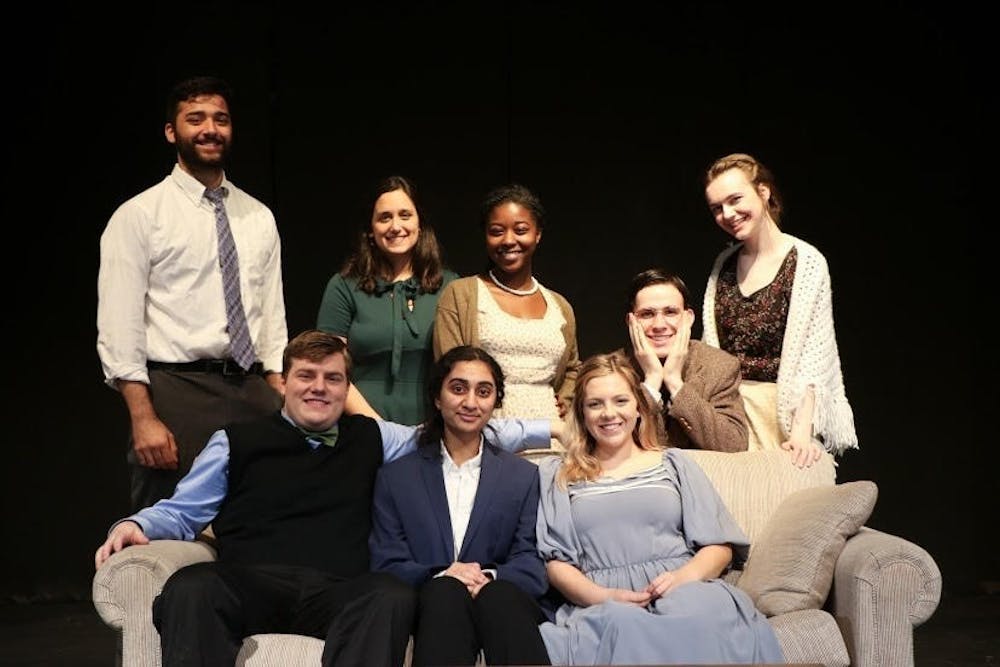Over the weekend, the Barnstormers presented their intersession show, Uncle Vanya. The play was a humorous, yet melancholic exploration of death, family, societal expectations and personal ennui.
The drama revolves around the life of an upper-class family, led by its aging patriarch Professor Serebryakov (junior Jonah Facciolli) eking out a boredom-laden provincial winter in his late first wife’s house.
Voinitsky, also known as Uncle Vanya (senior Frank Guerriero) — whose sister was the professor’s first wife — is in love with Yelena (senior Sydney Thomas), Serebryakov’s new wife. His love for her is unrequited, albeit not from lack of trying. Meanwhile, Yelena is falling in love with Astrov (sophomore Zach Galvarro), the professor’s doctor, a genius dedicated to protecting the forests in his native village from destruction.
To make things even more complicated, Sonya (junior Kinsey Tyler), daughter of the professor and his first wife, is also in love with Astrov, whose main confidant is Yelena.
As time passes in this uneasy status quo, Uncle Vanya’s cynicism toward the professor and life in general reaches dangerous proportions. This all happens as Yelena’s duty toward her aging husband begins to unravel. The actors constantly straddle a fine line in their ways of dealing with the anxieties of love and duty through pensive, poignant dialogue as well as heaps of comedy.
The best representative of this amalgam is Guerriero’s portrayal of Uncle Vanya, who, in the first scene, while in conversation with the doctor, accuses the professor of “wasting his life” writing about art that clever people have always known and stupid ones people don’t want to know.
Galvarro’s Astrov is an equally compelling source of entertainment, who provided his character with multiple humorous tics and physical posturing that would never fail to bring about laughter.
A standout comedic performance came from junior Ritika Kommareddi, who marvelously portrays Telegin, the unemployed, non-paying tenant in the house whose sole purpose seems to be to embarrass himself and play the guitar.
In an interview with The News-Letter, sophomore Gabe Feuerstein-Mendik, the play’s director, spoke about how one of the reasons for choosing the play Uncle Vanya was for these comedic elements.
“Uncle Vanya is a really interesting play because it’s Chekhov, who is known for having these really depressing plays. But this one’s actually pretty comedic,” he said.
He also commented on underlying themes and details that make the play especially important.
“A thing you don’t get in a lot of older plays was its portrayal of women,” he said. “We get to hear a woman ask another woman, ‘Are you happy?’ And it’s okay that she says no.”
Undoubtedly, this production of Uncle Vanya gives the women just as much stage presence as it does the men.
For example, in one of the later scenes, Yelena and Sonya are sitting together late at night while Sonya confides in Yelena about her love toward Astrov. While their discussions revolve superficially around him, they carry so much more weight; Yelena provides comfort and attempts to connect with her stepdaughter, knowing that if she told him she believed Astrov did not love her, it would break the nascent connection they were beginning to establish with each other.
Although Yelena loves Astrov, her final decision to stay with the professor reflected an uneasy reality of marriage as almost a contract of duty rather than one of love. Above all, the performance highlighted the play’s continuing relevance to modern love. Besides the thematic contemporaneity and the powerful acting, Feuerstein-Mendik said that the translation by Pulitzer Prize-winner Annie Baker added to the play’s global significance.
“She wrote the play with the intention of making it sound the same to American audiences as it did to Russian audiences a hundred years ago,” he said.
In the end, this rendition of Uncle Vanya was not only philosophically potent, emotional and intensely relevant, but also carefully crafted to highlight these aspects. It signals a continuing ability from the Barnstormers to tackle theatrical classics with deference, despite it not being a part of their main stage productions.
Although it is too late to catch this production of Uncle Vanya, I highly recommend attending their events in the future. The Barnstormers are here to carry on the traditions of creative storytelling.
Frank Guerriero is a staff writer for The News-Letter. He was not involved in the editing or writing of this piece.















